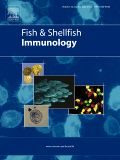
FISH & SHELLFISH IMMUNOLOGY
Scope & Guideline
Connecting Ecology and Immunology for a Sustainable Future
Introduction
Aims and Scopes
- Aquatic Immunology:
The journal primarily focuses on the immune mechanisms in fish and shellfish, exploring how these organisms respond to pathogens, environmental stressors, and dietary components. - Molecular and Cellular Mechanisms:
Research methodologies often include molecular characterization of immune-related genes and proteins, cellular assays, and transcriptomic analyses to understand the underlying mechanisms of immunity. - Pathogen Interaction Studies:
The journal includes studies on host-pathogen interactions, detailing how aquatic species defend against infections from various pathogens, including bacteria, viruses, and parasites. - Immunomodulation and Nutrition:
Research on how dietary supplements, probiotics, and immunostimulants affect the immune responses and overall health of aquatic species is a significant aspect of the journal. - Environmental Stress Responses:
The journal addresses the impact of environmental factors, such as temperature fluctuations, pollution, and salinity, on the immune functions of aquatic organisms. - Aquaculture Applications:
The findings published aim to provide insights that can enhance aquaculture practices, focusing on disease prevention, growth promotion, and improving the overall health of farmed species.
Trending and Emerging
- Genomic and Transcriptomic Approaches:
There is a growing trend towards utilizing genomic and transcriptomic analyses to explore immune responses, allowing for more in-depth understanding of genetic regulation in fish and shellfish. - Microbiome and Immune Interactions:
Research investigating the relationship between gut microbiota and immune responses is on the rise, highlighting the importance of microbial communities in maintaining health and resistance to disease. - Novel Immunotherapeutics and Vaccines:
Emerging studies focus on the development of innovative vaccines and immunotherapeutic strategies, including the use of probiotics, prebiotics, and plant-derived compounds to enhance immunity. - Environmental Immunology:
There is an increasing focus on how environmental stressors, such as pollutants and climate change, impact immune function, indicating a shift towards ecologically relevant immunology. - CRISPR and Gene Editing Technologies:
The application of CRISPR and other gene editing technologies to study immune functions and improve disease resistance in aquatic species is gaining momentum, opening new avenues for research.
Declining or Waning
- Traditional Vaccination Strategies:
There has been a noticeable decline in studies focusing on conventional vaccination methods, as new approaches such as DNA vaccines and live attenuated vaccines gain traction. - General Immune Response Studies:
Broad, non-specific studies on immune responses are becoming less common; instead, there is a trend towards more targeted research that investigates specific pathways or molecules. - In Vitro Studies without Field Applications:
Research that does not translate findings from in vitro studies to practical applications in aquaculture or conservation is decreasing, as the field emphasizes practical relevance. - Single Species Focus:
Studies focusing solely on a single species' immune response are declining in favor of comparative studies that involve multiple species or broader ecological contexts.
Similar Journals
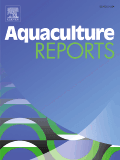
Aquaculture Reports
Exploring Innovative Solutions in Aquatic ScienceAquaculture Reports, published by Elsevier, is a prominent open-access journal dedicated to advancing knowledge in the fields of aquaculture, aquatic science, and animal science. Since its inception in 2015, this journal has quickly established itself as a leading platform for high-quality research, achieving a remarkable Q1 ranking in both Animal Science and Zoology and Aquatic Science as of 2023. With a Scopus ranking placing it in the top 7% of journals in Agricultural and Biological Sciences, Aquaculture Reports serves as an essential resource for researchers, professionals, and students alike, facilitating the exchange of innovative ideas and cutting-edge findings. The journal is indexed under ISSN 2352-5134 and is committed to fostering open access, ensuring that the latest research is readily available to the global scientific community. As it converges its years of publication from 2015 to 2024, Aquaculture Reports continues to shape the future of aquaculture research through rigorous peer-reviewed articles and impactful studies.
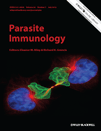
PARASITE IMMUNOLOGY
Exploring the Complexities of Immunological Defense.PARASITE IMMUNOLOGY, published by Wiley, is a leading journal in the field of immunology and parasitology, with an ISSN of 0141-9838 and E-ISSN of 1365-3024. Since its inception in 1979, it has played a pivotal role in advancing our understanding of host-parasite interactions, immunological responses to parasitic infections, and the mechanisms of immunological resistance. The journal is adeptly positioned within the academic community, currently holding a prestigious Q2 ranking in Parasitology and a Q3 ranking in Immunology for 2023, indicating its significant influence and relevance. Its comprehensive scope attracts a diverse readership, contributing to the discourse surrounding novel therapeutic approaches and emerging challenges in parasitic diseases. With a consistent convergence of research until 2024, PARASITE IMMUNOLOGY is an essential resource for researchers, professionals, and students seeking to deepen their knowledge and foster collaboration in these dynamic fields. Although it is not an open-access journal, the insights shared within its pages are invaluable for shaping future research trajectories.

Turkish Journal of Fisheries and Aquatic Sciences
Advancing aquatic knowledge for a sustainable future.Turkish Journal of Fisheries and Aquatic Sciences, published by the CENTRAL FISHERIES RESEARCH INST, is a key resource in the fields of Fisheries and Aquatic Sciences, catering to a global community of researchers and professionals. With its ISSN 1303-2712 and E-ISSN 2149-181X, this journal offers an engaging platform for the dissemination of high-quality research from Turkey, covering critical topics within Animal Science and Aquatic Science. As a third quartile journal in both categories (Q3, 2023), it provides valuable insights, contributing to a growing body of literature that addresses aquatic ecosystems, fisheries management, and biodiversity conservation, thereby enhancing the sustainability of aquatic resources. The journal has shown considerable impact, ranking 144th in Animal Science & Zoology and 116th in Aquatic Science within Scopus, reflecting its relevance and credibility within the academic community. Operating from 2008 to 2024, it invites open access submissions to foster collaboration and knowledge sharing among scientists, students, and practitioners alike, reinforcing its dedication to advancing the science of aquatic ecosystems.
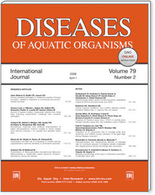
DISEASES OF AQUATIC ORGANISMS
Exploring the Frontiers of Aquatic Disease ManagementDiseases of Aquatic Organisms, published by Inter-Research in Germany, is a prominent academic journal with a focus on the study and management of diseases affecting aquatic organisms, including fish, mollusks, and corals. Since its inception in 1990, this journal has been a vital resource for researchers and professionals in the fields of aquatic science and ecology, evidenced by its Q2 ranking in both categories for 2023. With an ISSN of 0177-5103 and E-ISSN 1616-1580, it offers valuable insights and advancements in the understanding of aquatic health issues and their ecological implications. Though not an open-access journal, it maintains rigorous academic standards and fosters an international dialogue on emerging pathogens and their management, contributing significantly to the body of knowledge that informs sustainable practices in aquatic environments. As the field continues to evolve, Diseases of Aquatic Organisms remains a cornerstone for those dedicated to the preservation and study of aquatic biodiversity and ecosystem health.

AIMS Allergy and Immunology
Exploring Breakthroughs in Allergy ResearchAIMS Allergy and Immunology is a prestigious open access journal dedicated to advancing knowledge in the fields of allergy and immunology. Published by the American Institute of Mathematical Sciences (AIMS), this journal provides a vibrant platform for researchers, practitioners, and scholars to share groundbreaking findings and insights. Recognized for its commitment to disseminating high-quality research since its inception in 2017, AIMS Allergy and Immunology contributes significantly to the understanding of complex immunological mechanisms and allergic responses, thus playing a pivotal role in enhancing clinical practices and therapeutic strategies. With its ISSN 2575-615X, the journal aims to facilitate a robust exchange of ideas and promote collaboration within the scientific community. Researchers and practitioners are encouraged to access the latest studies and reviews, which are all freely available online, ensuring that vital information reaches a global audience without barriers. Together, we can tackle the challenges posed by allergies and immune disorders through rigorous scientific inquiry and innovation.
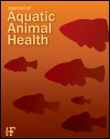
JOURNAL OF AQUATIC ANIMAL HEALTH
Transforming aquatic health knowledge into practice.JOURNAL OF AQUATIC ANIMAL HEALTH, published by Wiley, is a premier scholarly journal dedicated to advancing the field of aquatic animal health. With an ISSN of 0899-7659 and an E-ISSN of 1548-8667, this journal has established itself as a key resource for researchers, professionals, and students involved in aquatic sciences since its inception in 1989. Covering a comprehensive range of topics within aquatic animal health, the journal aims to disseminate significant findings and foster multidisciplinary collaborations. As of 2023, it is ranked in the third quartile (Q3) within the broader category of Aquatic Science, according to Scopus, reflecting its growing influence in the field. Operating without an open access model, the journal maintains stringent standards for publication, ensuring that it remains a respected platform for high-quality research. Located in Hoboken, NJ, the journal is poised to continue contributing vital insights that enhance the understanding and management of aquatic animal health worldwide.

Fish and Shellfish Immunology Reports
Pioneering research at the aquatic immunology frontier.Fish and Shellfish Immunology Reports is a distinguished journal published by ELSEVIER, focusing on the vital intersection of immunological responses in aquatic organisms. Established in 2021, it has quickly gained recognition for its contributions to the fields of Aquatic Science and Immunology, achieving a commendable Q2 ranking in Aquatic Science and a Q3 ranking in Immunology as of 2023. This journal is pivotal for researchers, professionals, and students, providing a platform for the dissemination of innovative research findings and critical reviews on fish and shellfish immunology. Based in the United Kingdom, Fish and Shellfish Immunology Reports remains committed to advancing scientific knowledge and collaboration in this niche yet significant area of study. The journal is indexed in Scopus, illustrating its academic credibility with rankings in both the Agricultural and Biological Sciences as well as the Immunology and Microbiology categories. Although currently not an open-access publication, it prides itself on maintaining high standards of peer review and ethical research practices.
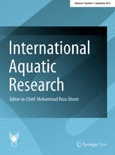
International Aquatic Research
Illuminating the wonders of marine and freshwater environments.International Aquatic Research, published by the Islamic Azad University, Tonekabon Branch, is a vital open-access journal dedicated to advancing the field of aquatic sciences since its inception in 2009. With an ISSN of 2008-4935 and an E-ISSN of 2008-6970, the journal plays a significant role in disseminating high-quality research findings from Iran and around the globe. It covers a broad range of topics in aquatic biology, fisheries science, and marine ecology, making it a valuable resource for researchers, professionals, and students alike. As of 2023, it ranks in the third quartile (Q3) of the aquatic science category with a Scopus rank of #138 out of 247 in Agricultural and Biological Sciences, reflecting its growing influence in the field. With a commitment to promoting scientific knowledge and fostering collaboration among aquatic research communities, International Aquatic Research is positioned as an essential platform for those dedicated to understanding and conserving marine and freshwater environments.
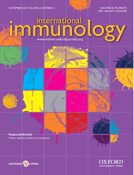
INTERNATIONAL IMMUNOLOGY
Elevating the Standards of Immunological Research Worldwide.INTERNATIONAL IMMUNOLOGY, published by OXFORD UNIV PRESS, stands out as a premier journal in the field of immunology, providing a vital platform for disseminating groundbreaking research and innovative developments within the discipline. With an impressive Q1 ranking in Immunology and Allergy, as well as in Medicine (miscellaneous), it consistently showcases high-impact studies that contribute to the advancement of immunological knowledge. The journal spans over three decades, from its inception in 1989 to its ongoing contributions as of 2024, thus solidifying its reputation in the scientific community. Researchers, professionals, and students will find valuable articles that delve into the complexities of immune responses, therapeutic interventions, and emerging immunological paradigms, ensuring INTERNATIONAL IMMUNOLOGY remains at the forefront of knowledge in the life sciences.
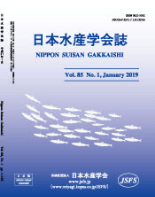
NIPPON SUISAN GAKKAISHI
Exploring the Depths of Fisheries ScienceNIPPON SUISAN GAKKAISHI, published by the Japanese Society of Fisheries Science, is a prestigious journal with a long history dating back to its inaugural issue in 1932. This journal, which spans key contributions to the field of Aquatic Science, serves as a vital platform for the dissemination of important research findings related to fisheries and aquatic biology, fostering knowledge and innovation in Japan and beyond. Although it is not an open-access publication, its rigorous peer-review process ensures the quality and integrity of the articles published. The journal is currently listed in the Q4 category for Aquatic Science according to the 2023 metrics, placing it within a niche but significant corner of the research landscape. With an ISSN of 0021-5392 and E-ISSN of 1349-998X, it continues to provide essential insights that benefit researchers, professionals, and students alike, highlighting advancements and challenges within aquatic ecosystems over a converged year span that continues to evolve through to 2024.